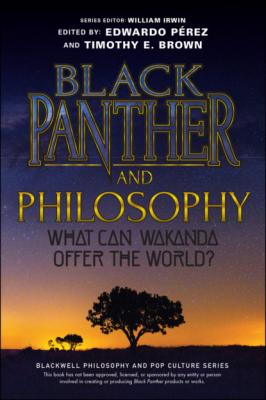Black Panther and Philosophy. Группа авторов
Читать онлайн.| Название | Black Panther and Philosophy |
|---|---|
| Автор произведения | Группа авторов |
| Жанр | Афоризмы и цитаты |
| Серия | |
| Издательство | Афоризмы и цитаты |
| Год выпуска | 0 |
| isbn | 9781119635864 |
By the end of the film their missions have come together and they have too. T’Challa and Nakia (and Shuri) are building international outreach centers in Oakland and beyond, working alongside each other to repair Wakanda’s relationship with the rest of the world. This is not charity any more than it is a self-inflicted punishment or an attempt at global compensation. Rather, it’s the work of relational repair.
“I Must Right These Wrongs”
Maybe it sounds odd to describe this globally engaged approach to Wakanda’s foreign policy as reparative justice. Why should Wakandans need to make amends? What do they have to apologize for? Nakia is not Black Widow, with red in her ledger. Black Panther is not Iron Man, with a long career of arms-dealing and war-profiteering to atone for. But Wakanda has its own history, one stretching back long before its newest king or even his father’s reign. When T’Challa returns to the spirit realm, he confronts not only T’Chaka but all the former Wakandan kings gathered there. “You were wrong! All of you were wrong! To turn your back on the rest of the world!”
T’Challa sees his forefathers’ neglect of their cousins outside of Wakanda’s borders as a wrong that he must make right. It may be too late to repair the relationships with N’Jobu and N’Jadaka, lost as they are. But it’s never too late to begin to repair our place in the global community, to find a way to look after one another as if we were one single tribe.
Notes
1 1. Charles Mills, “‘Ideal theory’ as ideology,” Hypatia 20 (2005), 165–184, 168.
2 2. John Rawls, A Theory of Justice: Revised Edition (Cambridge: Harvard University Press, 1999), 216.
3 3. John Rawls, Justice as Fairness: A Restatement (Cambridge: Harvard University Press, 2001).
4 4. Aristotle, Nicomachean Ethics, trans. David Ross (New York: Oxford University Press, 1990), Book V.
5 5. Mills, 168.
6 6. As quoted in Nancy Berlinger, After Harm (Baltimore, MD: Johns Hopkins University Press, 2005), 61.
7 7. Alec Walen, “Retributive justice,” in Stanford Encyclopedia of Philosophy, at https://plato.stanford.edu/entries/justice-retributive.
8 8. Margaret Urban Walker, What Is Reparative Justice? (Milwaukee, WI: Marquette University Press, 2010), 15.
9 9. Rupert Ross, Returning to the Teachings (Toronto: Penguin Press, 2006), xvii, emphasis original.
10 10. Margaret Urban Walker, “The Expressive Burden of Reparations,” in Alice Maclachlan and Allen Speight eds., Justice, Responsibility, and Reconciliation in the Wake of Conflict (New York: Springer, 2013), 205–225; see also Bernard Boxill, “The morality of reparations,” Social Theory and Practice 2 (1972), 113–123.
11 11. So much for Killmonger’s triumphant declaration that the sun will never set on the Wakandan empire.
12 12. Robert Proctor, “Agnotology,” in Robert Proctor and Londa Schiebinger eds., Agnotology (Palo Alto, CA: Stanford University Press, 2008), 8.
13 13. David Michaels, Doubt Is Their Product (Oxford: Oxford University Press, 2008).
14 14. Adam Serwer, “The tragedy of Erik Killmonger,” The Atlantic, February 21, 2018, at https://www.theatlantic.com/entertainment/archive/2018/02/black-panther-erik-killmonger/553805.
15 15. Robert Nozick, Philosophical Explanations (Oxford: Clarendon Press, 1981), 367.
16 16. Serwer.
17 17. Christopher Lebron, “Black Panther is not the movie we deserve,” Boston Review, February 17, 2018, at http://bostonreview.net/race/christopher-lebron-black-panther; see also “Afrofuturism, liberation, and representation in Black Panther,” Democracy Now! February 28, 2018, at https://truthout.org/video/afrofuturism-liberation-representation-in-black-panther-a-roundtable-discussion.
18 18. Serwer, emphasis original; see also Audre Lorde, “The Master’s Tools Will Never Dismantle the Master’s House,” in Sister Outsider (Berkeley, CA: Crossing Press, 1984), 110.
4 “What Would You Have Wakanda Do about It?” Black Panther, Global Justice, and African Philosophy
Christine Hobden
KILLMONGER: You know, where I’m from, when Black folks started revolutions, they never had the firepower or resources to fight their oppressors. Where was Wakanda? Hmm? Yeah, all that ends today.
The world presented in Black Panther, although fantastical, is, for the most part, the world we currently inhabit: a deeply unjust one. This injustice and inequality is experienced between members of a society as well as across societies and states. While Killmonger, the villain, is pitted against T’Challa, the hero, Killmonger’s tragic backstory generates sympathy or at least understanding given the injustice he learned as a boy. The racial injustice Killmonger experienced in 1991 Oakland, California, resonates deeply with experiences of contemporary Black Americans, as illustrated in the resurgence of the Black Lives Matter movement. This is an example of injustice within a particular society. Killmonger’s quest also highlights international injustice and inequality: why did he suffer because he lived in one state and not another? What was so significant about state borders that Wakanda was willing to ignore the injustice experienced in other states? These questions of global justice are profoundly relevant today. We can think here, for one example, of the vastly unequal distribution of COVID-19 vaccines globally, leaving those in the Global South without “firepower or resources to fight” this common enemy.
So, Black Panther’s narrative offers significant commentary on the issue of justice, and, as we’ll focus on in this chapter, global injustice in particular. Indeed, a core question running throughout the movie,
